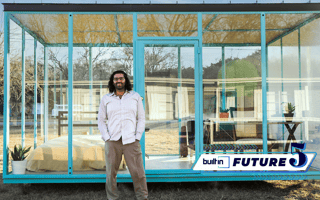
Sure the latest initiatives from the Teslas, Apples and Googles of the industry tend to dominate the tech news space — and with good reason. Still, the tech titans aren’t the only ones bringing innovation to the sector.
In an effort to highlight up-and-coming startups, Built In launched The Future 5 across 11 major U.S. tech hubs. Each quarter, we will feature five tech startups, nonprofits or entrepreneurs in each of these hubs who just might be working on the next big thing. Read our round-up of Austin’s rising startups from last quarter here.
* * *
Sam Haytham was talking with friends at an Austin coffee shop one day when he decided to do something about the city’s homeless problem.
He started by interviewing 80 people experiencing homelessness to understand how they became homeless, what resources are available and the limitations of those resources. Through these conversations, he heard stories about agencies failing to communicate with each other and couples being split apart because they are of different genders.
Haytham came away from those conversations determined to create an emergency housing solution that could be easily deployed to areas in need.
In 2020, he launched Kiro Action, which he describes as “a social good enterprise masquerading as a for-profit company.” The startup manufactures and delivers flat-packed structures that can be unpacked and assembled within four hours without any special machinery.
We’re trying to bring dignity to all of these issues, whether it’s homelessness, veteran homelessness or the migrant workers that are picking your fruit.”
Haytham has a background in foreign policy, international affairs and the defense world, so launching a housing startup was not exactly in his wheelhouse.
Nonetheless, his idea has gained acclaim. In March, Kiro Action won the Best Bootstrap award at the SXSW Pitch Contest. Haytham said he has had plenty of venture capital firms reach out to him about funding, but said he prefers to bootstrap and connect with like-minded social good organizations before scaling his operation.
Haytham has also made in-roads in government, nonprofit and philanthropic circles.
Later this year, Kiro Action’s homes will be used to house people experiencing homeless in four cities that have yet to be announced. The structures will be placed on underutilized government-owned properties on a temporary basis until a more permanent solution can be developed.
In one of the cities, a corporate sponsor bought 50 shelters, which will be donated to two or three nonprofits to provide housing for veterans experiencing homelessness. If the project is successful, the corporation has expressed interest in sponsoring homes in other locations.
The management of the sites would be overseen by local organizations, which have told Haytham that, to ensure effective management, the homes will be grouped in clusters of no more than 20.
In addition to housing veterans and people experiencing homelessness, Haytham hopes the flex space structures can be used to house migrant farm workers and displaced residents after floods, wildfires and other natural disasters. A Texas insurance company has already agreed to partner with the company to deploy these structures within hours of a natural disaster.
“We’re trying to bring dignity to all of these issues, whether it’s homelessness, veteran homelessness or the migrant workers that are picking your fruit,” Haytham said.

As word of the structures has spread, Kiro Action has also heard from homeowners who wanted to use the houses as an extra office, workout space or music studio during the pandemic. Haytham said customers were delighted to find a way to get additional space without the hassle of a renovation, an addition or searching for a new house.
Another consumer-oriented use for the flex spaces could be pop-up hotels or festival housing for Austin City Limits, SXSW or other events.
For consumer uses, the houses start at $25,000 for a 96-square-foot shelter and go up to $40,000 for a 192-square-foot shelter. For government entities providing homeless shelters, the company charges between $5,000 and $8,000.
Haytham said in 95 percent of the country the consumer-oriented shelters do not require any special government permitting.
“We tried to stay within existing codes with normal construction methods, as much as possible, so that we’re not building something completely new,” he said.
The houses designed for people experiencing homelessness, migrant farmers or natural disaster victims come equipped with a bathroom and a kitchenette, which cities could permit because they are classified as emergency housing, Haytham said. The water for those units could either come from the city’s water utility or from water that is trucked in, stored in a tank and pumped into the individual structures with inverter generators.
The units come with the option of either single or dual occupancy to accommodate couples that may otherwise not qualify to stay at a homeless shelter due to gender restrictions.
The structures themselves are made of 12-gauge structural steel. They come with the option of either clear glass walls on all sides or solid metal walls on one to three sides. The structures also have roll-down privacy curtains.
“The housing panels can be made of glass or more privacy with a specialized metal siding wall panel, but the real technology is in the foundational frame system that goes up in hours in a grid system,” he said. “We’re trying to be on the front lines of poverty alleviation, and in the future, you’ll see our housing panels building a small home for 1/10 of the home prices now.”



